Learn from the Leaders in Healthcare Education
Say hello to a new chapter in your healthcare career. Educational attainment is around the corner with MTI New York.
Explore All ProgramsFeatured Programs
-
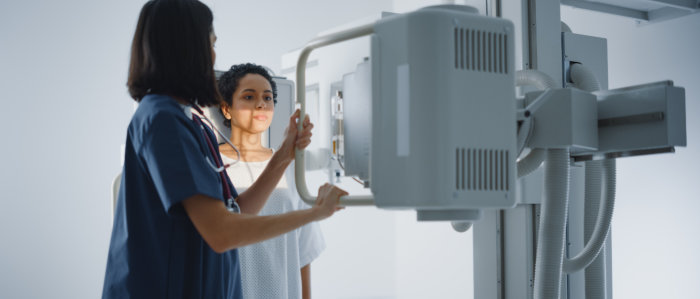
Radiography Technology
The Radiography Program at the Medical Training Institute of New York is designed to prepare students to perform various radiographic examinations and procedures under the supervision of professional radiographers. Students have the opportunity to gain both didactic knowledge and practical experience in routine radiography, trauma radiography, fluoroscopy, mammography, and tomography. In addition, elective rotations in nuclear medicine, ultrasound, angiography, computerized tomography (CT), cardiac catheterization, and MRI are also offered.
- Prepare competent entry-level Radiography technologists in the cognitive (knowledge), psychomotor (skills), and affective (behavior) learning domains.
- Describe and apply principles of healthcare safety, asepsis, ethics, and professionalism while working in the role of a Radiography technologist.
- Adjust and maintain imaging equipment.
- Follow precise orders from physicians on what areas of the body to image.
- Prepare patients for procedures, including taking a medical history and shielding exposed areas that do not need to be imaged.
- Position the patient and the equipment in order to get the correct image.
- Operate the computerized equipment to take images.
- Work with physicians to evaluate the images and to determine whether additional images need to be taken.
- Keep detailed patient records.
The 2,220 clock hours of Radiography Technology consist of 620 hours of Didactic, 400 hours of Lab, and 1,200 Clinical Rotation Hours.
Admission Requirement: Associate degree is required
What Are My Career Opportunities as a Radiography Technologist?
- Hospitals
- Emergency rooms
- Operating rooms
- Critical care units
- Therapy centers
- Research laboratories
- Educator
Radiography Technologist can work in a variety of environments:
- Hospitals
- Emergency rooms
- Operating rooms
- Critical care units
- Medical laboratories
- Outpatient care centers
- Private healthcare facilities
- Doctors' offices
- Therapy centers
- Research laboratories
Preparation for ARRT Certification Examinations
- National licensed exam administered by the American Registry of Radiologic Technologists (ARRT)
MTI Provides Job Placement Assistance
Admissions Requirement: Must have Associates/Bachelors
Winter 2025 Enrollment OpenTotal hours: 2220
Day, Evening, Weekend Options
Total weeks: 74-101
Hours/Weeks: 21-35
Apply by January 21, 2025
Class Start Date: January 21, 2025
Tuition: $45,000
Total Program cost: $49,406Certificate
-
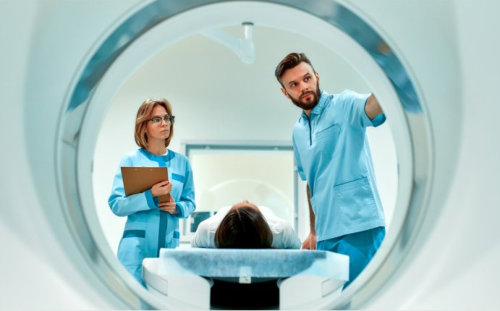
Radiography Technology Hybrid
The Radiography Program at the Medical Training Institute of New York is designed to prepare students to perform various radiographic examinations and procedures under the supervision of professional radiographers, students perform various radiographic examinations and procedures. Students have the opportunity to gain both didactic knowledge and practical experience in routine radiography, trauma radiography, fluoroscopy, mammography, and tomography. In addition, elective rotations in nuclear medicine, ultrasound, angiography, computerized tomography (CT), cardiac catheterization, and MRI are also offered.
- Adjust and maintain imaging equipment
- Follow precise orders from physicians on what areas of the body to image
- Prepare patients for procedures, including taking a medical history and shielding exposed areas that do not need to be imaged
- Position the patient and the equipment in order to get the correct image
- Operate the computerized equipment to take images
- Work with physicians to evaluate the images and to determine whether additional images need to be taken
- Keep detailed patient records
The 2220 clock hours of Radiography Technology consist of 620 hours of Didactic, 400 hours of Lab, and 1,200 Clinical Rotation Hours.
Admission Requirement: Associate degree is required
What Are My Career Opportunities as a Radiography Technologist?
- Hospitals
- Emergency rooms
- Operating rooms
- Critical care units
- Therapy centers
- Research laboratories
- Educator
Radiography Technologist can work in a variety of environments:
- Hospitals
- Emergency rooms
- Operating rooms
- Critical care units
- Medical laboratories
- Outpatient care centers
- Private healthcare facilities
- Doctors' offices
- Therapy centers
- Research laboratories
Preparation for ARRT Certification Examinations
- National licensed exam administered by the American Registry of Radiologic Technologists (ARRT)
MTI Provides Job Placement Assistance
Winter 2025 Enrollment OpenDay, Afternoon, Evening, and Weekend
74-101 weeks, 22-30 hrs./week
Apply by January 21, 2025
Class Start Date: January 21, 2025
Tuition: $45,000
Total Program Cost: $49,406Certificate
-
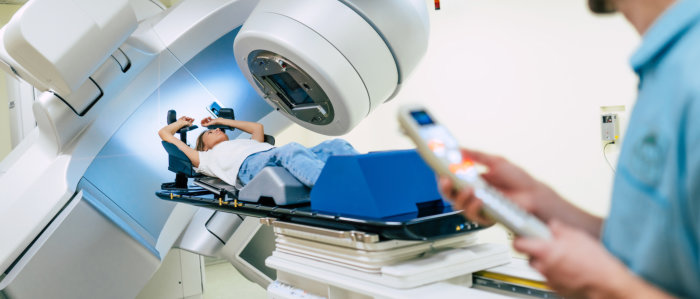
Radiation Therapy Technology
The Radiation Therapy Program at the Medical Training Institute of New York is designed to prepare students to perform various radiographic examinations and procedures under the supervision of professional radiographers, students perform various radiographic examinations and procedures.
Students have the chance to gain didactic knowledge and practical experience in routine radiography, trauma radiography, fluoroscopy, mammography, and tomography. In addition, elective rotations in nuclear medicine, ultrasound, angiography, computerized tomography (CT), cardiac catheterization, and MRI are also offered.
- Treatment planning: Work with radiation oncologists and medical physicists to develop and prescribe treatment plans
- Patient positioning: Use X-rays to identify tumors and position patients for treatment
- Patient monitoring: Observe patients for unusual reactions to treatment
- Safety: Protect patients and themselves from improper exposure to radiation
- Record keeping: Maintain detailed records of treatments for future use by physicians
The 2240 clock hours of Radiation Therapy Technology consist of 620 hours of Didactic, 420 hours of Lab, and 1,200 Clinical Rotation Hours.
Admission Requirement: Associate degree is required
What Are My Career Opportunities as a Radiation Therapist
- Hospitals
- Emergency rooms
- Operating rooms
- Critical care units
- Therapy centers
- Research laboratories
- Educator
Radiation Therapists can work in a variety of environments:
- Hospitals
- Emergency rooms
- Operating rooms
- Critical care units
- Outpatient care centers
- Private healthcare facilities
- Doctors' offices
Preparation for ARRT Certification Examinations
- National licensed exam administered by the American Registry of Radiologic Technologists (ARRT)
MTI Provides Job Placement Assistance
Admissions Requirement: Must have Associates/Bachelors
Winter 2025 Enrollment OpenTotal hours: 2280
Day, Evening, Weekend Options
Total weeks: 76-104
Hours/Weeks: 21-35
Apply by January 21, 2025
Class Start Date: January 21, 2025
Tuition: $45,600
Total Program Cost: $50,206Certificate
-

Radiation Therapy Hybrid
The Radiation Therapy Program at the Medical Training Institute of New York is designed to prepare students to perform various radiographic examinations and procedures under the supervision of professional radiographers, students perform various radiographic examinations and procedures.
Students have the chance to gain didactic knowledge and practical experience in routine radiography, trauma radiography, fluoroscopy, mammography, and tomography. In addition, elective rotations in nuclear medicine, ultrasound, angiography, computerized tomography (CT), cardiac catheterization, and MRI are also offered.
- Treatment planning: Work with radiation oncologists and medical physicists to develop and prescribe treatment plans
- Patient positioning: Use X-rays to identify tumors and position patients for treatment
- Patient monitoring: Observe patients for unusual reactions to treatment
- Safety: Protect patients and themselves from improper exposure to radiation
- Record keeping: Maintain detailed records of treatments for future use by physicians
The 2240 clock hours of Radiation Therapy Technology consist of 620 hours of Didactic, 420 hours of Lab, and 1,200 Clinical Rotation Hours.
Admission Requirement: Associate degree is required
What Are My Career Opportunities as a Radiation Therapist
- Hospitals
- Emergency rooms
- Operating rooms
- Critical care units
- Therapy centers
- Research laboratories
- Educator
Radiation technologists can work in a variety of environments:
- Hospitals
- Emergency rooms
- Operating rooms
- Critical care units
- Outpatient care centers
- Private healthcare facilities
- Doctors' offices
Preparation for ARRT Certification Examinations
- National licensed exam administered by the American Registry of Radiologic Technologists (ARRT)
MTI Provides Job Placement Assistance
Winter 2025 Enrollment OpenDay, Afternoon Evening, and Weekend
75-102 weeks, 22-30 hrs./week
Apply by January 21, 2025
Class Start Date: January 21, 2025
Tuition: $45,600
Total Program Cost: $50,206Certificate
-
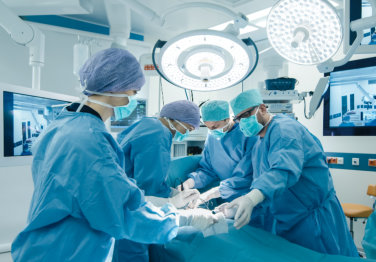
Surgical Technology Hybrid
Surgical Technology
The Surgical Technology program at the Medical Training Institute of New York is designed to provide students with the cognitive (knowledge), psychomotor (skills), and affective (behavior) learning domains necessary to be employed as an entry-level surgical technologist. The AST Core Curriculum was used as a guideline to facilitate the formation of the surgical technology program curriculum, which includes an on-campus lecture component, an on-campus laboratory component, and an off-campus integrated clinical component.
- Prepare competent entry-level surgical technologists in the cognitive (knowledge), psychomotor (skills), and affective (behavior) learning domains.
- Describe and apply principles of healthcare safety, asepsis, ethics, and professionalism while working in the role of a surgical technologist and describe legal responsibilities in the healthcare setting.
- Demonstrate the appropriate use of surgical instrumentation, equipment, supplies, and technology; and follow established principles and practices for the operating room and other healthcare settings and situations.
- Utilize critical thinking and interpersonal communication skills to effectively work with patients, family members, community members, colleagues, and other healthcare professionals.
- Discuss and describe basic principles of anatomy, physiology, pathophysiology, microbiology, and pharmacology related to patient care; and demonstrate methods used to safely transfer, position, prep, and drape surgical patients.
- Explain the uses and effects of various anesthetic and pharmacological agents used in the care of surgical patients.
The 1240 clock hours of Surgical Technology consist of 440 hours of Didactic, 200 hours of Lab, and 600 Clinical Rotation Hours.
Admission Requirement: High school diploma/GED, Entrance Examination
What Are My Career Opportunities as a Surgical Technologist
- Registered nurse
- Veterinary technician
- Medical sales representative
- Operating room assistant
- Clinical Coordinator
- Educator
Surgical Technologist can work in a variety of environments:
- Hospitals
- Surgical in-patient departments
- Surgical out-patient departments
- Medical Clinics
- Dental Surgical departments
- Free-standing urgent care facilities
Preparation for NBSTSA Certification Examinations
- National Board of Surgical Technology and Surgical Assisting (NBSTSA)
MTI of New York will prepare you for your CST Examination by covering the following content areas:
content areas:
Ancillary Duties
- Administrative and Personnel
- Equipment Sterilization and Maintenance
Basic Science
- Anatomy and Physiology
- Microbiology
- Surgical Pharmacology
MTI Provides Job Placement Assistant
Winter 2025 Enrollment OpenDay, Evening, Weekend
50-62 weeks, 20-25 hrs./week
Tuition Cost: $22,000
Total Program Cost: $25,669
Apply Now -
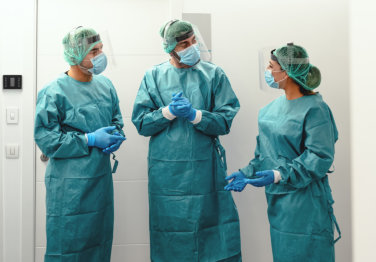
Central Sterile Processing Technician Hybrid
The Sterile Processing Technician program at Medical Training Institute is designed to provide students with entry-level training that will prepare them to function in the sterile processing and distribution areas of health care facilities. The program provides students with knowledge of surgical instruments, microbiology, medical equipment, surgical terminology, and storage and distribution, as well as the skills required for sterilization and decontamination.
- Preparing, processing, issuing surgery equipment and checking if they function correctly
- Regularly conducting inspections for deficiencies in instruments
- Keeping records of sterilization
- Performing assembly, maintenance, as well as testing and monitoring sterilization machines
- Cleaning material after surgery by hand before sterilization
The 800 clock hours of Sterile Processing Technician consist of 200 hours of Didactic, 200 hours of Lab, and 400 Clinical Rotation Hours.
Admission Requirement: High school diploma/GED, Entrance Examination
Sterile Processing Technicians can work in a variety of environments:
- Hospitals
- Postsecondary education institutes
- Doctors’ offices
- Dentists’ offices
- Outpatient care centers
Preparation for International Association of Healthcare Central Service Material Management (IAHCSMM) Certification Examinations
- Certified Registered Central Service Technician (CRCST) credential
Preparation for NBSTSA Certification Examinations
- National Board of Surgical Technology and Surgical Assisting (NBSTSA)
MTI of New York will prepare you for your CRCST Examination by covering the following content areas:
- Cleaning, Decontamination & Disinfection
- Preparation & Packaging
- Sterilization Process
- Patient Care Equipment
- Sterile Storage & Inventory Management
- Documentation & Record Maintenance
- Customer Relations
MTI Provides Job Placement Assistant
Winter 2025 Enrollment OpenDay, Evening, Weekend
20-25 weeks, 32-40 hrs./week
Tuition Cost: $12,650
Total Program Cost: $15,346
Apply Now -
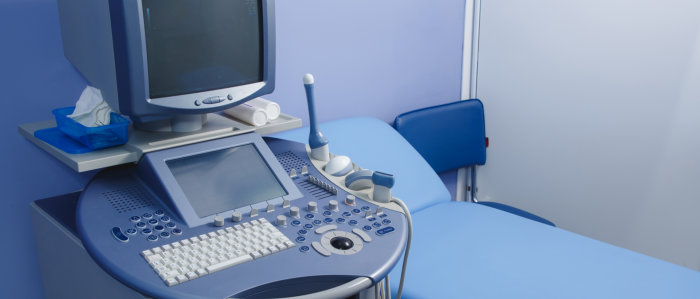
Diagnostic Medical Sonography Hybrid
The Diagnostic Medical Sonography program at the Medical Training Institute of New York is designed to prepare students to perform diagnostic ultrasound examinations required of an entry-level general sonographer to include, but not be limited to, the abdomen, pelvis, pregnant female pelvis, and superficial structures. Students are also introduced to vascular ultrasound. The student will have the opportunity to study the anatomy, physiology, and pathophysiology of scanned organ systems, recognize the sonographic patterns of the organs, learn the protocols for a logical and thorough survey of the organs, and provide accurate and technical impressions of the interpreting physician. Upon completion of the Diagnostic Medical Sonography Program, the student will be expected to:
- Describe and utilize routine procedures performed in Diagnostic Medical Sonography
- Create high-quality diagnostic scans.
- Demonstrate proficiency and fluency in the use of medical terminology, especially those pertaining to ultrasound.
- Be skilled in the operation of ultrasound instrumentation and laboratory equipment under guidance from professional staff
- Demonstrate the ability to maintain quality control of the ultrasound equipment.
- Identify and understand important features of disease processes, including Pathophysiology, signs and symptoms, significant laboratory data, diagnostic techniques, prognosis, and treatment.
- Demonstrate a working knowledge of hospital functions in general and the ultrasound department in particular, including basic skills, emergency care, patient-technologist relationships, and professionalism.
- Be successful in a career as a Registered Diagnostic Medical Sonographer or Registered Diagnostic Cardiac Sonographer
The 1800 clock hours of Diagnostic Medical Sonography consist of 800 hours of Didactic, 400 hours of Lab, and 600 Clinical Rotation Hours.
Admission Requirement: High school diploma/GED, Entrance Examination
What Are My Career Opportunities as a Diagnostic Medical Sonographer
- Medical Terminology
- Sonographer
- Diagnostic medical sonographer
- Ultrasound technologist
- Medical Practitioner
- Clinical Coordinator
- Educator
What Are My Career Opportunities as a Diagnostic Medical Sonographer
- Hospitals
- Physicians’ offices
- Medical and diagnostic labs
- Outpatient imaging departments
- Free-standing urgent care facilities
Preparation for National ARDM and ARRT Certification Examinations
- American Registry of Diagnostic Medical Sonography (ARDMS)
- American Registry of Radiologic Technologists (ARRT)
MTI of New York will prepare you for your SPI Examination by covering the following content areas:
- Clinical Safety
- Patient care
- Physical Principles
- Ultrasound Transducers
- Quality Assurance
- Protocols
- New Technologies
MTI Provides Job Placement Assistant
Winter 2025 Enrollment OpenDay, Evening, weekend
72-90 weeks, 21-25 hrs./week
Tuition Cost: $25,000
Total Program Cost: $30,614
Apply Now
Ishmeal T. Alarbi
Founder, President & CEO- 212-206-2554212-204-8577 Ext. 101 (Main)
- 212-804-6002
- ialarbi@mtiofnewyork.com
- Medical Training Institute of New York 211 East 43rd St., 2nd Floor, New York, NY 10015
- info@mtiofnewyork.com
- www.mtiofnewyork.com



